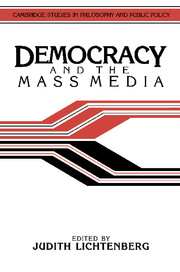Book contents
- Frontmatter
- Contents
- Preface
- List of contributors
- Introduction
- 1 Liberal constraints on private power?: reflections on the origins and rationale of access regulation
- 2 Liberalism and free speech
- 3 Foundations and limits of freedom of the press
- 4 Why the state?
- 5 Practices of toleration
- 6 Access in a post–social responsibility age
- 7 Who decides?
- 8 Four criticisms of press ethics
- 9 Political communication systems and democratic values
- 10 Mass communications policy: where we are and where we should be going
- 11 Content regulation reconsidered
- 12 The rationale of public regulation of the media
- 13 The role of a free press in strengthening democracy
- Index
2 - Liberalism and free speech
Published online by Cambridge University Press: 05 June 2012
- Frontmatter
- Contents
- Preface
- List of contributors
- Introduction
- 1 Liberal constraints on private power?: reflections on the origins and rationale of access regulation
- 2 Liberalism and free speech
- 3 Foundations and limits of freedom of the press
- 4 Why the state?
- 5 Practices of toleration
- 6 Access in a post–social responsibility age
- 7 Who decides?
- 8 Four criticisms of press ethics
- 9 Political communication systems and democratic values
- 10 Mass communications policy: where we are and where we should be going
- 11 Content regulation reconsidered
- 12 The rationale of public regulation of the media
- 13 The role of a free press in strengthening democracy
- Index
Summary
The First Amendment says that Congress shall make no law abridging the freedom of speech or of the press. Our laws and courts take an expansive view of the liberty of the printed press. Its principal organs are in private hands, owned and operated as private property. No government agency evaluates their product as better or worse, as more or less “in the public interest.” A long and honored national tradition, from the Founding Fathers to the present, declares that the printed press should not be regulated by government, outside a few narrowly drawn areas such as national security and obscenity.
But the electronic press enjoys no such protection. Governments at various levels own, license, or franchise the principal means of communication: radio, television, cable systems. The Federal Communications Commission (FCC) is charged with regulating all of these in the public interest, and many states and municipalities have a hand in the matter as well. The fundamental decisions of the Supreme Court have upheld the power of the government to engage in these activities. Indeed, the Court has held that the constitutional ban on abridging freedom of speech – which forbids regulation of newspapers or magazines – may actually require regulation for electronic media.
This double standard is anomalous in principle, and increasingly difficult to implement in practice, as the two forms of media coalesce.
- Type
- Chapter
- Information
- Democracy and the Mass MediaA Collection of Essays, pp. 66 - 101Publisher: Cambridge University PressPrint publication year: 1990
- 7
- Cited by



